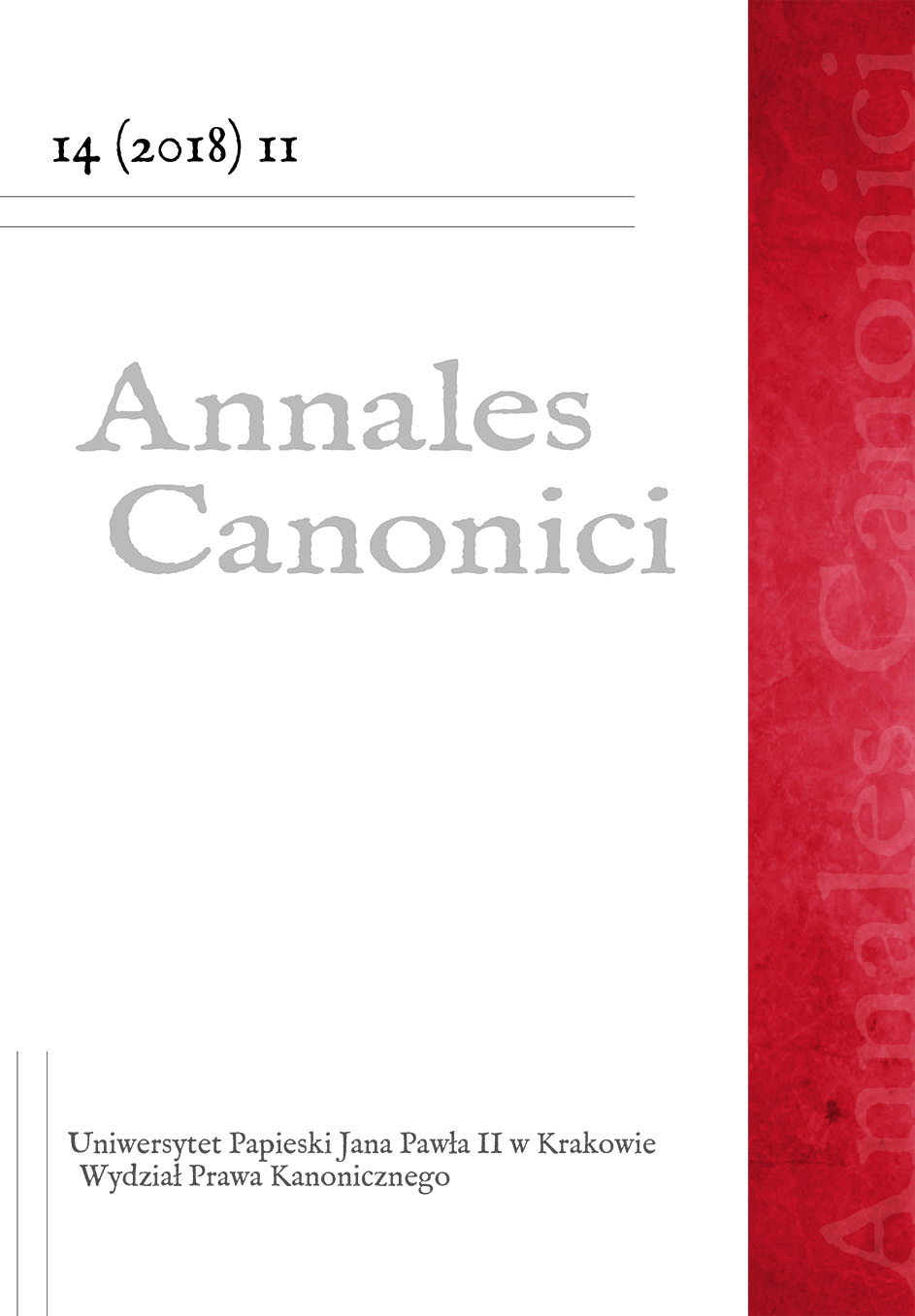Witnesses’ testimony and moral certainty of the judge in cases regarding the nullity of marriage
DOI:
https://doi.org/10.15633/acan.2777Keywords:
proficient, moral certainty, psychology, judge, witnessAbstract
The judge passes a sentence in the cannonic proces after gaining so called „moralis certitudo (moral certainty). One of the elements that the judge uses in gainig the moral certainty is the body of evidence collected in the cannonic proces, for instance testimony of witnesses. Witnesses are called on the grounds of calling decree which is issued by the leading judge. Interrogation of witnesses is based on a set of previously prepared questions. The aim is to gain proper information. A very important issue that influences the moral certainty of the judge are not only the answers of the witness but also the form of the answers. They can cotntribute a lot to the case. Modern psychology has instruments that can verify honesty and truthfulness of the testimony That is why the final assesment of all the evidence is the responsibility of the leading judge and all the body of judges which is responsible for the sentence. Difficulty in gaining the moral certainty can be that the judge gains the moral certainty but the deliberate missinforming by the witness can cause that the judge do not gain unbiased truth.
References
Aleksandrowicz J., Zaburzenia nerwicowe, zaburzenia osobowościowe i zachowania dorosłych (według ICD-10), Kraków 1998.
Błaszczak Ł., Metodologiczne podstawy teorii dowodów w postępowaniu cywilnym, w: Dowody w postępowaniu cywilnym, red. Ł. Błaszczak, K. Markiewicz, E. Rudkowska-Ząbczyk, Warszawa 2010, sw. 1–40.
Brzemia-Bonarek A., Dopuszczalność dowodów zdobytych w sposób niegodziwy w kanonicznym procesie o nieważność małżeństwa, Katowice 2007.
Codex Iuris Canonici auctoritas Ioannis Pauli PP. II promulgatus. Kodeks prawa kanonicznego, przekład polski zatwierdzony przez Konferencję Episkopatu, Poznań 1984.
Código de Derecho Canónico, red. P. Lombardia, Pamplona 2007; polskie tłumaczenie: Kodeks Prawa Kanonicznego. Komentarz, red. P. Majer, Kraków 2011.
Gruza E., Psychologia sądowa dla prawników, Warszawa 2009.
http://www.psychologiawygladu.pl/2015/10/jak-analizowac-wypowiedzi-pod-katem.html (02.02.2018).
Jagodziński H., Kanonizacja prawa cywilnego, „Kieleckie Studia Teologiczne” 3 (2004), s. 355–365.
Kaczmarek-Templin B., Dowód z zeznań świadków, w: Dowody w postępowaniu cywilnym, red. Ł. Błaszczak, K. Markiewicz, E. Rudkowska-Ząbczyk, Warszawa 2010, s. 442–481.
Kędziora R., Dowód z dokumentu jako podstawowy środek dowodowy w postępowaniu administracyjnym, w: Dowodzenie w procesach cywilnych, gospodarczych i administracyjnych, red. R. Sztychmiler i M. Różański, Olsztyn 2014, s. 265–275.
Kędziora R., Kodeks Postępowania administracyjnego, Komentarz, wyd. 3, Warszawa 2011.
Kodeks postępowania administracyjnego, ustawa z dnia 14 czerwca 1960r., Dz.U. Nr 30 poz. 168 ze zm.
Kodeks postępowania cywilnego, ustawa z dnia 17 listopada 1964r., Dz.U. Nr 43 poz. 296, ze zm.
Kodeks postępowania karnego, ustawa z dnia 6 czerwca 1997r., Dz.U. Nr 89, poz. 555 ze zm.
Krajczyński J., Oświadczenia stron i zeznania świadków w sprawach o nieważność małżeństwa ob Exclusionem Indissolubilitatis, „Prawo Kanoniczne” 57 (2014) 3, s. 41–63.
Krzywkowska J., Krzywkowska M., Wymóg pewności moralnej u sędziego orzekającego w sprawach o nieważność małżeństwa, w: Problemy z sądową ochroną praw człowieka, red. R. Sztychmiler, J. Krzywkowska, Olsztyn 2012.
Marten Z., Psychologia zeznań, Warszawa 2012.
Mierzejewski K., Poszukiwanie prawdy obiektywnej a pewność moralna sędziego w kanonicznym procesie małżeńskim, „Prawo Kanoniczne” 56 (2013) 1, s. 137–152.
Pajszczyk R., Dowód ze świadków w postępowaniu kanonizacyjnym, studium historyczno-prawne, Poznań 2006.
Pawluk T., Prawo kanoniczne według kodeksu Jana Pawła II, t. 4, Olsztyn 1990.
Pikus S., Niezawisłość sędziego kościelnego, Lublin–Sandomierz 2009.
Pius XII, Allocutio ad Prealatos Sacrae Romanae Rotae, 1 X 1942, „Acta Apostolicae Sedis” 34 (1942), s. 338–343.
Pontificium Consilium de Legum Textibus, Instructio servanda a tribunalis dioecesianis et interdioecesianis in pertractandis causis nullitatis matromonii (Dignitas connubii), „Communicationes” 37 (2005), s. 11–89.
Rozkrut T., Dowody, w: Komentarz do Instrukcji procesowej „Dignitas connubii”, red. T. Rozkrut, Sandomierz 2007, s. 229–296.
Sztychmiler R., Świadkowie i zeznania (kan. 1547–1573), w: Komentarz do Kodeksu Prawa Kanonicznego, t. 5, red. J. Krukowski, Poznań 2007, ss. 123–315.
Wenz W., Decyzja sędziego, w: Komentarz do Instrukcji procesowej „Dignitas connubii”, red. T. Rozkrut, Sandomierz 2007, s. 325–351.
Wojciechowski B., Analiza i ocena zeznań świadków, Sopot 2016.
Downloads
Published
Issue
Section
License
Copyright (c) 2019 Łukasz Pisz

This work is licensed under a Creative Commons Attribution 4.0 International License.
The author declares that he owns the copyright to the work (article) and that it is not limited in the scope covered by the above declaration and that the work (article) is an original work and does not infringe the copyright of other persons.
The author allows the Pontifical University of John Paul II in Krakow to use the paper free of charge, non-exclusive and unlimited in time by, i.e.:
– keeping in records and reproduction of the copies of the work using printing, reprography, magnetic recording and digital technology;
– trade in the original or copies on which the work has been recorded (introduction to the market, lending or rental of the original or copies, public exhibition, display, as well as making the work available to the public in such a way that everyone can have access to it in a place and at a time chosen by them);
– inclusion of the work in a collective work;
– granting by the Pontifical University of John Paul II in Krakow a Creative Commons Sub-licence Authorship Recognition-Non-commercial Use-No Subsidiaries 3.0 Poland
The Pontifical University of John Paul II in Krakow makes the work available on the Magazine Platform of the university under the Creative Commons Attribution-Non-commercial Use-No Subsidiary Works 3.0 Poland license.
Thus, it entitles all interested parties to use the work under the following conditions:
- the author and the title of the work will be given,
- the place of publication (journal title and internet address of the originally published work) will be indicated,
- the work will be distributed in a non-commercial manner,
- no dependent works will be created.

